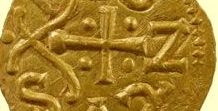Cheating `metal detective` officer fails to declare largest value gold coin haul in UK
A police officer who cheated a landowner out of a £15,000 share of a treasure trove has been jailed.
A police officer who cheated a landowner out of a £15,000 share of a treasure trove has been jailed. Police Constable David Cockle discovered a haul that would have been the largest value find of historic Merovingian gold coins in the UK while searching the landowner`s field. The pair had agreed to split the proceeds of anything unearthed by the Norfolk Constabulary officer. But PC Cockle did not keep to the deal after digging up the ten Merovingian Tremissis coins dating back to the seventh century. As well as tricking the landowner, he also failed to tell the coroner. Instead the officer sold the French coins to a dealer in three separate batches to disguise the fact they were hidden treasure and kept the profits, a court was told. Another metal detectorist had discovered 35 Merovingian coins at the same site and declared them honestly. Had PC Cockle done the same, it would have surpassed the discovery of 37 such coins at Sutton Hoo in the last century, Ipswich Crown Court heard on Wednesday (March 8). The 51-year-old officer, dismissed by the force last month in what was described by Chief Constable Simon Bailey as “one of the grossest breaches of trust”, admitted between April 2012 and November 2015 keeping the proceeds of the sale of coins found in the Norfolk field, with three counts of converting criminal property left to lie on file. Sentencing Judge Rupert Overbury said PC Cockle had more than 30 years of experience as a metal detectorist and knew the legal process he should have followed to declare the find. He added that the coins were extremely rare, from the Anglo Saxon period which was relatively poorly understood and that some of the coins had never been recovered. In sentencing PC Cockle to 16 months in prison and banning him from metal detecting for five years, he told the defendant his motivation for the dishonest behaviour had been “pure greed”. Under the five-year criminal behaviour order, he is also barred from owning metal detecting equipment and from entering into agreements with landowners to use their land for metal detecting. He faces five years in jail if he breaches the order. Gerard Pounder, prosecuting, said PC Cockle had lied about where the coins were found and registered them as being discovered at different sites around the country, including Boston, Lincolnshire, Grays, Essex and another near Norwich. He said the coins had a high gold purity, and that PC Cockle sold the ten coins for £1,500 each in smaller parcels of two, three and five coins to claim they were not a hoard. Nick Bonehill, mitigating, said his client was of previous good character, had a successful career in finance before he joined the police and could no longer work in either sector as a result of the dishonesty conviction. PC Cockle had split from his wife, who also worked for Norfolk Constabulary, in 2012. The court heard he was motivated by his ex-wifes demands for a £10,000 divorce settlement, but Judge Overbury noted that Cockle had also suffered gambling losses. At his misconduct hearing in February, PC Cockle was told by Mr Bailey that it was clear he had been allowed to use the land to search for treasure “because he was a police officer and the farmer liked the idea of a police officer on his land”. The chief constable added that the officer had let the force down by keeping hold of the medieval coins and “most importantly let the farmer down and the wider public”.


